Scene: Two beings recline side by side on a slab of rock, angled towards the audience. The rock is the size of an emperor-size bed. The stage is in semi-darkness, lit only by a dim indigo light. It is otherwise adorned only with sparse creosote brush. There is a conspicuous X shaped fissure in the ‘earth’ below the slab. Rep reclines above Talpa. When they speak, their accents and intonations are distinct from each other: Rep speech is more formal and clipped, Talpa’s is a rustic brogue.
Talpa is dressed all in black in a hooded smock and un-tailored, three-quarter length trousers made from a rough cloth, similar to the garb of a Vietnamese peasant. Her hood is always up, shrouding her face which, when glimpsed, is very white. She has small dark eyes, pale lips. Her hands and feet are bare, very white, and large for her body size. She is shy, humble, diffident but fierce when roused. Her voice is usually soft, her eyes typically downcast.
Rep is clad in the beautiful indigo robes and shesh of a Tuarag man. He is taciturn and awkward with emotion, tending to be haughty. His deep voice is usually a reasoned monotone. His shesh covers most of his face and forms a turban on his head, but his reptilian skin shines blue-black. He wears desert goggles, like old fashioned motorcycle goggles. His eyes are bright amber.
TALPA: Do you think it would be able to live up here?
REP: There’s no precedent. No one knows whether the ancient gene editing would cross – er – not species, I suppose, but between our races. Or whether it would be dominant. It has never happened.
TALPA: In our history we speak of classes not races, the elite who could afford editing and those others who could not.
REP: Whether race or class, we have no knowledge of hybridity.
TALPA: And ever Mark Twain shall meet.
REP: (With no hint of amusement) I think that’s ‘never the twain shall meet’.
TALPA: We don’t read, obviously.
REP: Obviously.
TALPA: (With a small shiver of fear) Is it getting bright?
REP: Not yet. Quite soon, though. I’ll make sure… You know.
TALPA: Do you think I should get rid of it?’
REP: (After a pause) Could you do that, get rid of it?
TALPA: I don’t like us calling it ‘it’.
REP: Could you… (He hesitates, swallows, and his tongue darts out of his mouth). Could you get rid of her or him?
TALPA: I don’t like ‘get rid’ either.
REP: No, of course, but could you?
TALPA: Termination is quite common among us these days. Because of lack of space and poor air quality. We’re very restricted. After we went on retreat, there had to be policies. People tell the story that in the first days we needed diggers so badly we were encouraged to reproduce willy-silly!
REP: Nilly. I don’t know what it means.
The sit in silence for a moment, both considering. Talpa turns her head to look directly up a Rep; she moves her body towards him a little, inviting affection. Rep appears wholly unaware of the signals.
TALPA: The lizards, the little ones, are awakening. I can hear their tiny claws on the sandstone rocks.
REP: Wouldn’t there be questions?
TALPA: Not really. Termination is quite common. I would surely be scolded for not taking care but…
REP: And no checks? They wouldn’t find out that it’s, that she’s… He’s?
TALPA: I don’t think so, but I’ve never… Maybe we do. Some standard procedure. Oh Sun!
Talpa clasps her hands to her face.
REP: What would they do if they did find out? To you?
TALPA: I don’t think there’d be punishment, but people would be so frightened. I would be shunned.
REP: (Evidently surprised, he looks directly at Talpa, intent) Really?
TALPA: (Fidgets a little, discomfited) Well…
REP: I realise it would be a shock, but I’d have thought your people would be pleased, that they might feel, well, honoured or something?
TALPA: (Keeping her tone even) Blessed?’
REP: Well...
TALPA: (Suddenly angry) You really think you’re so much better than us? I know that you do. Do you pity me is that it, is that the attraction? Or am I just a pallid curiosity to you, an object of scientific interest?
REP: (Slowly, considered, felt) You are beautiful, to me. From when I first watched you, stealing food from the shade-houses, eating that peach, dribbling the juice…
TALPA: (Squirming a little with pleasure, grinning) You are that word you told to me.
REP: (Breathes the exotic syllables) A voyeur.
TALPA: I didn’t even scent you or sense your movement. You were suddenly just there and there was no chance to run, no way past or under. I was so frightened…’
REP: Frozen.
TALPA: You’re so, so clean, sharp and almost odourless like onyx. Your slow heat…
REP moves closer to TALPA, sliding his arm about her shoulder. His tongue flicks over his lips and his mouth finds hers. They begin a passionate kiss, his hand slips under her smock…
TALPA: (Pushes him away, gently but firmly) No.
REP: I want you and I know that you…
TALPA: (Looks away from him, seeking the horizon) The bright is coming. We have to talk this through. People will notice soon: I can feel it.
REP: It doesn’t show.
TALPA: Seeing is not how my people know.
REP: Could I… Again… Touch?
Talpa guides his hand to her belly, hold it there for a long moment. Rep’s whole body shivers with excitement, fear… He removes his hand, as if burned but studies his fingers with eyes full of wonder
REP: Before you have to go down… (Unable to hide the horrified fascination in his voice as he makes himself say the word) Below.
TALPA: Beneath.
REP: (Fuelling his own excitement and desire) Underground.
TALPA: Sub…
They fall into each other’s arms again, kiss, a hard embrace. TALPA wraps her arms tight around REP, drinking him in…
REP: You’re crushing me!
TALPA: (Releases him) Oh I’m sorry, I…
Light plays on Rep’s face rendering his skin iridescent, shifting red, copper and gold. The two remain close together, Rep propping his head on his hand, gazing at Talpa. Reaching into her hood, he strokes her face with the back of his fingers.
REP: Your skin is velvet.
TALPA: Your scales turn me on too.
REP: The earthy taste of you is intoxicating.
TALPA: Your breath is tingling fresh, electric: ozone.
REP: Your nose. Those tiny ears…
TALPA: Weird that you don’t have any.
REP: We’re so very different.
TALPA: And yet the same.
REP: If my people found me with you, they would surely kill me too. You wouldn’t believe the stories they tell of your people. They consider you filthy beyond imagining. For most of my kind, mating with one of you, it would be like… Like nothing else, incomparably perverse. Worse than with a corpse of even a camel.
TALPA: Oh Sun and Moon and Stars!’ We hear stories of arenas, of hunts, using us for sport!
REP: Folk tales, the rarest of cult events if not wholly myths, I assure you. These days you are regarded like bad spirits, Tokoloshe, too fearfully foul even to contemplate as real.
TALPA: Well, thank you.
REP: I mean…
TALPA: You blame us for poisoning the ground water, the collapse of rickety buildings or some ancient bridge, and, of course, all missing and spoiled food, anything stolen in the night.
REP: We can testify to the veracity of the latter, at least.
TALPA: Mostly we eat the fungi we cultivate. And roots. Also worms.’
REP: (Grimaces and makes a disgusted noise deep in his throat)
TALPA: It’s not as bad as eating insects! (It’s her turn to grimace)
REP: Insect protein saved our race.
TALPA: Worms sustain us. But your fruit and vegetables are so sweet and rich, just too tempting, especially for those like me who have a green tooth.’
REP: Your teeth aren’t green, they are as light and sparkling as middle day.
TALPA: As the ghost of middle day maybe. I don’t believe you. Tell me again how I look to you?’
REP: You tell me how you sense me first. Tell me about my scent and how keen touch and sound are for you: Tell me how I feel to you, I like that. Very much.
TALPA: (Strictly) We don’t have time for this.
REP: Please, I…
TALPA: Don’t you feel anything for him or her?
REP: Conceived in all that shocking sense of the forbidden, in the elation of the strange and, well, yes, in sin.
TALPA: I don’t believe in sin. My people are steadfast: either divinity never existed or it forsook us long, long ago. Or, most commonly, we believe that we killed it: you and us; the people of Before. The gods died with the climate.
REP: Some of my own people keep the spark of divinity alive. To survive we must have hope, even false hope. Our philosophers and scientists…
TALPA: The idea of hope is cruel distraction from the conflagration. As the earth gets ever hotter and the weather more random, amidst the flame and chaos, where are we to find such hope?
REP: Perhaps in our union?
TALPA: (Undistracted) Respite is all we can hope for, us underground and you in the shade of your space mirrors and your solar shields.
REP: But we have come together, you and I…
TALPA: It’s not just about us and our twists anymore.
REP: You mean trysts, I think. Although…
TALPA: We have it to consider, him or her.
REP: I wonder would it – she or he – see properly?
TALPA: (Snarls) Properly? Sand and Silt and Clay! Would he be as deaf to the Earth as you are…
REP: Or be able to stand the heat? I keep coming back to that.
TALPA: Maybe he would be grey, unable to live in either the bright or the murk. Maybe he’d burn up here and wouldn’t be able to breathe the subterranean air nor tolerate our high carbon dioxide levels.
REP: On the Brightside, she could be the one-eyed man in the kingdom of the blind.
TALPA: You’re not making a clod of sense, why would she have one eye and be a man? That is solid rock, no way through: I don’t get it. Please, burrow deeper!
REP: It’s an old, old story, though I think that I misrepresent the plot. I was supposing that our daughter might be able to know both the bright and the dark, become a bridge to bring our peoples together – back together.’
TALPA: (Gulps) Daughter…
REP: I have that feeling. Ever since I touched your belly. It is very strong, and I never knew anything like it before. I cannot explain, but I now feel certain.
TALPA: The best of both bad worlds?
REP: Or, as you said, the worst.
They fall silent again for a long moment. A predawn breeze stirs the creosote brush and their clothes.
REP: I think you should have our daughter.
TALPA: (Sits up and moves away from him) Oh you do, do you?
REP: Yes, I do.
TALPA: Well it wouldn’t be you who gave birth to a monster or a god, would it? It wouldn’t be you who people would reject, perhaps harm. Oh no, you’d be up here bathing in the morning Sun, feeding, fuelling; you would be happily tending the fruits in your shade houses, riding your stupid camel…
REP: You think we have it easy? If I got caught out in the full heat of the sun, it would explode me – I’ve seen it happen: A woman I knew. She could stand this life no longer, not after… The dryness, the constant thirst, the care we must take, the harsh discipline of climate life. Her spirit was parched. She deliberately stepped out into the midday mad, stripped off her robes, her shesh, and stood naked. I could only watch from the solar shelter as she glowed, pulsed, then burst into flame like a bloody star...
TALPA: A woman you knew?
REP: Yes.
TALPA: How well did you know her?
REP: Oh for the sake of rain! You cannot be jealous of a dead woman, someone who killed herself so horribly.
TALPA: Oh, can’t I? Well, thanks for telling me how I can feel.
REP: That woman bore a heavy burden, for all of us.
TALPA: (Sarcastically) She sounds so cool.
REP: Sometimes I envy you, hidden away underground, chilled out and safe.’
TALPA: Safe? Safe? With you people still boring into our homes for the last drops and nuggets, splashes and puffs of fuel, fracking us to death, even though you have unlimited sunshine!
REP: We always need more and more fuel for cooling.
TALPA: Scrapping the barrel!
REP: Scraping.
TALPA: Safe? With you causing earthquakes and pumping chemicals into the Earth that we live in? It’s you who poison the water, yours and ours!
REP: Enough!
TALPA: Never enough, not for you lot!
REP: Stop it now…
TALPA: Safe? When the super-storms that you seed strike with no warning and our burrows flood…
REP: (Angrily) You should go. Now. There is already pink on the horizon.
Talpa looks and indeed there is indeed the faintest of pink casts to the light.
TALPA: (Quivering with fright and anger, but stubborn) You sodding go! I don’t want to have to look at you anymore. Go back to your shining black women!
REP: Oh, don’t be ridiculous...
TALPA: Well I am, aren’t I? Mating with a dry-roast reptile!
REP: You don’t mean that, you…
TALPA: (Screams) Go!
REP: Tomorrow night?
TALPA: (Slaps him across the side of his face with her big left hand) Get out of my senses!
Rep reels back from the blow, but refuses to look away. Slowly, deliberately he rises, freshly wrapping his shesh around his lower face.
REP: (Ice-Cold) If that’s how it is to be.
TALPA: (Holding back hot tears and hugging herself) Just leave me alone!
Rep gives her a long look and then jumps down from the rock, lands lithely and strides off towards the east (back stage) where a pink-orange dawn light is now clearly visible. He disappears from view. Talpa sobs. Then realising sunrise is imminent, she too scrambles down from the rock and makes to scuttle away…. In her terrible hurry, though, she catches her foot in a fissure in the Earth. There is an audible ‘crack as her ankle breaks and she pitches to fall flat on her face. She cries out. Dawn continues to gather…
TALPA: (Shouts, louder each time) Rep! (Pause, she sobs) Rep! (Pause) REP!
Talpa turns her body around as far as she can, sniffing the air for any sign of rescue, cocking her ear, listening. Her hood falls from her face. Everything is silent but for a dawn chorus of chirping, clicking lizards that grows ever louder. A front of golden light begins to creep forward across the stage. Talps pulls desperately at her trapped leg. She screams loudly. The light reaches her injured foot.
TALPA: (Yells after Rep) Hope! (And then calmly towards the audience) Of course. Her name is Hope.
Cruel white light shines straight into the audience’s eyes for several painful seconds, the chirping of lizards is deafening. When the light goes off and the chirping subsides to nothing, the stage is empty, suffused in crimson light. Whisps of smoke rise from the stage where Talpa lay.
CURTAIN


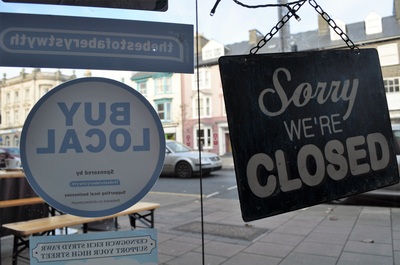

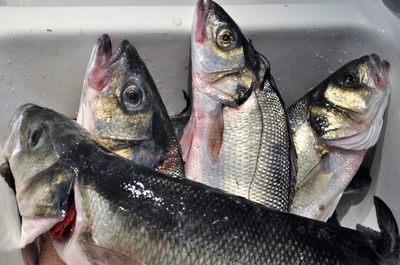
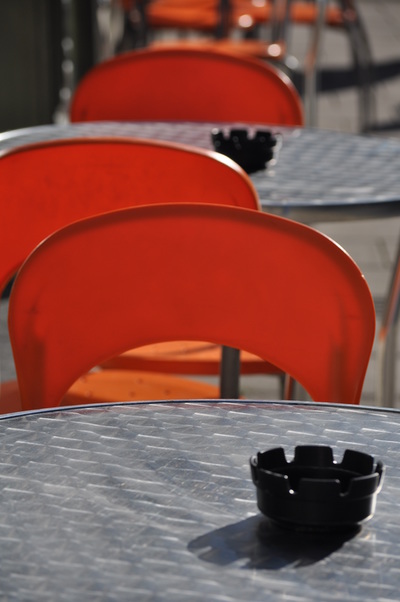

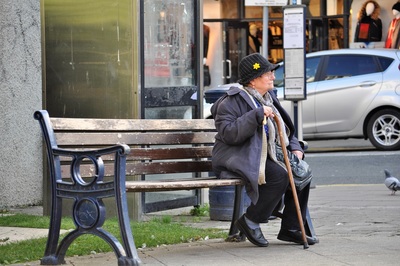

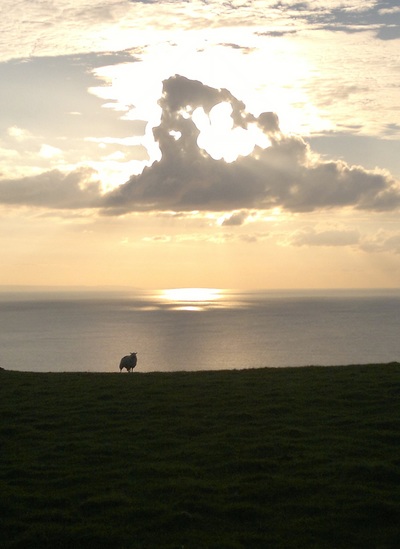
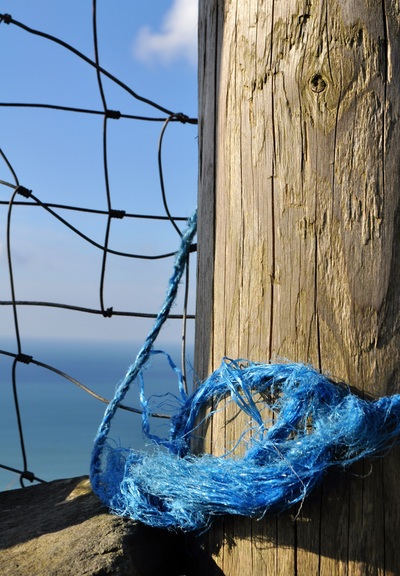
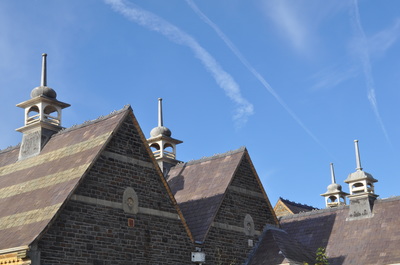

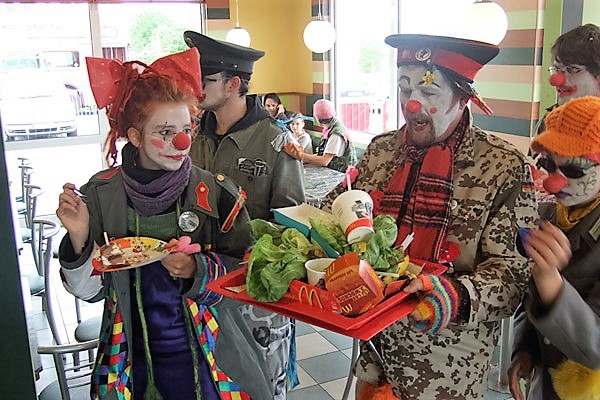
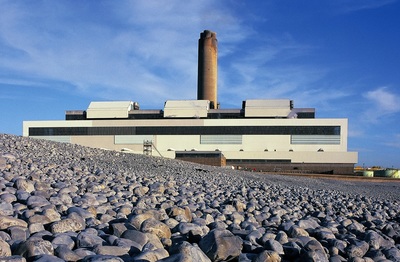
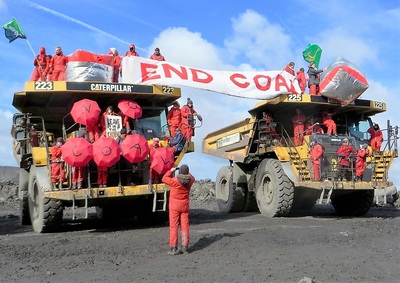
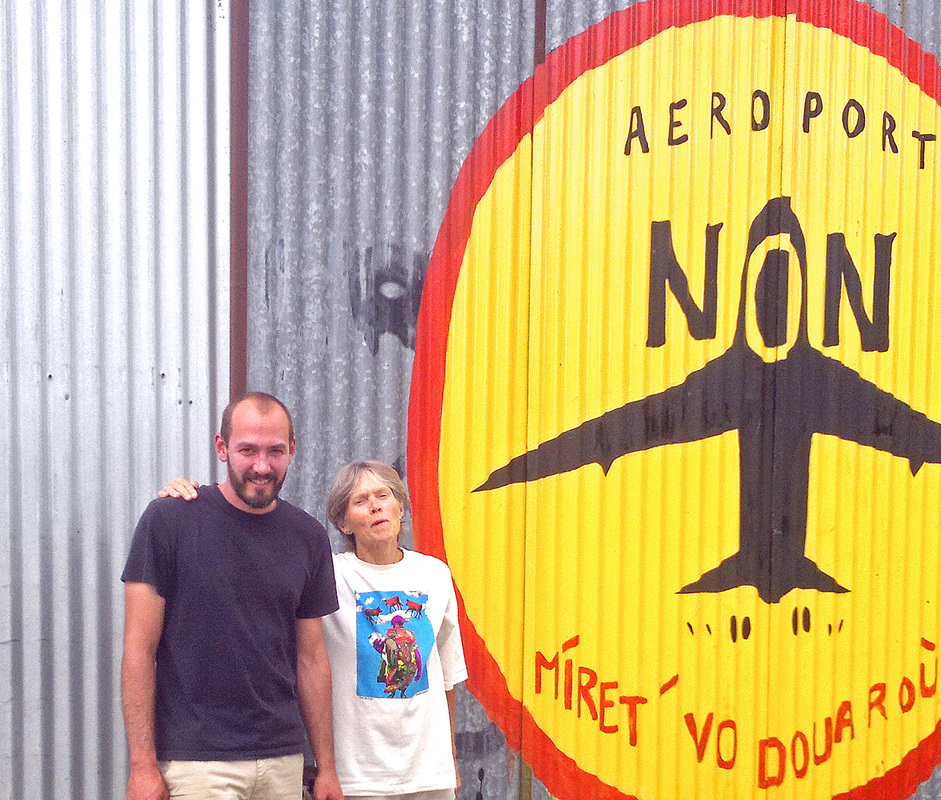


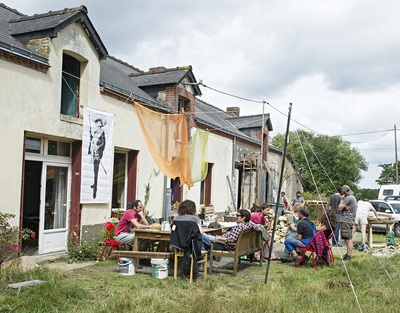
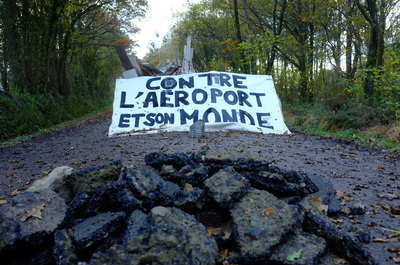
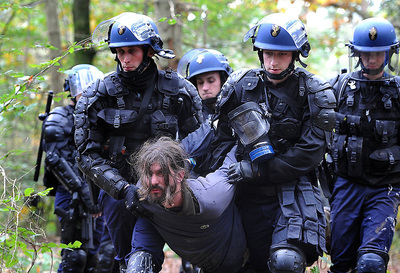
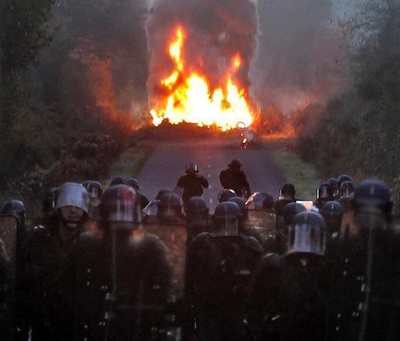
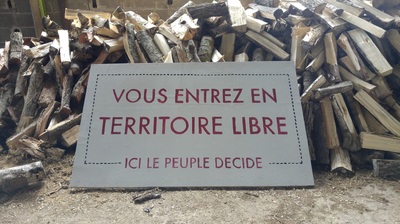
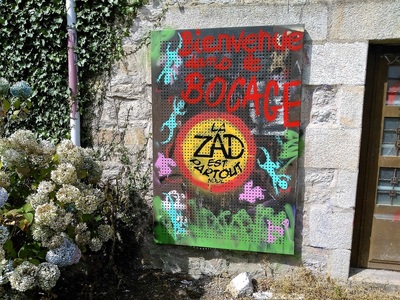
 RSS Feed
RSS Feed
